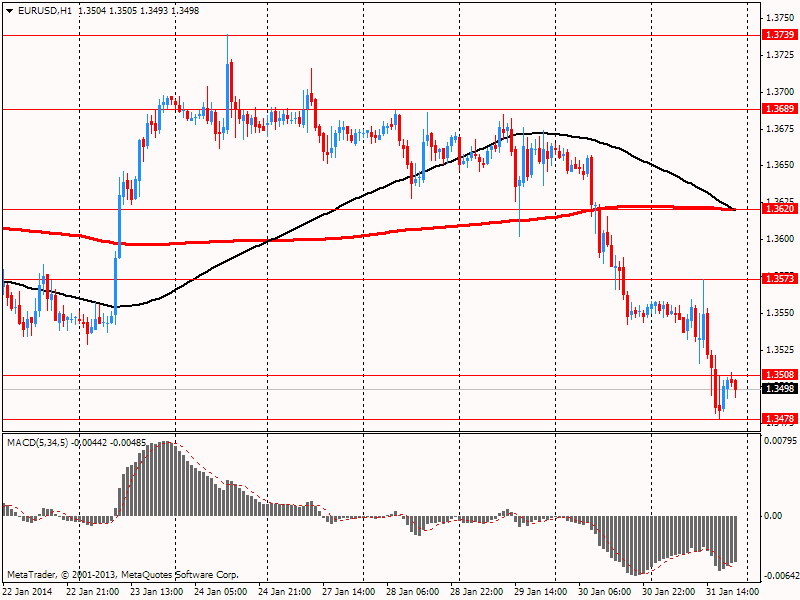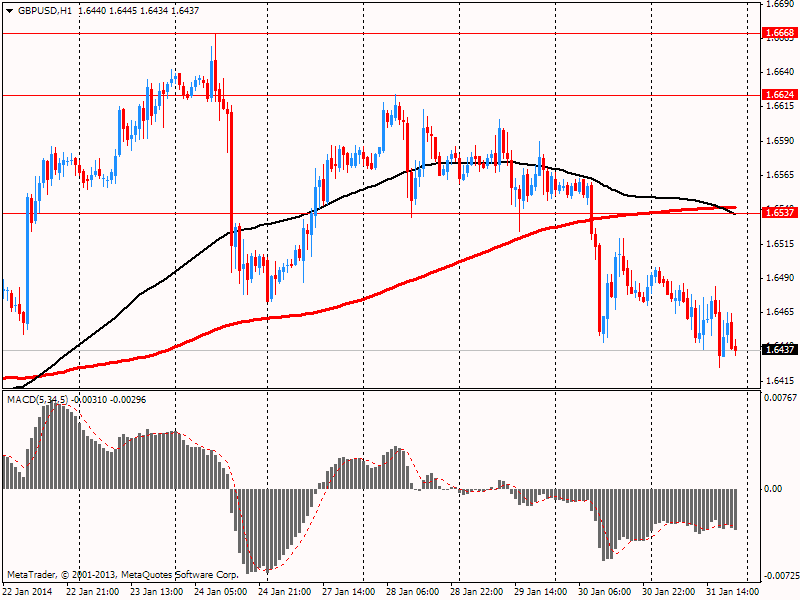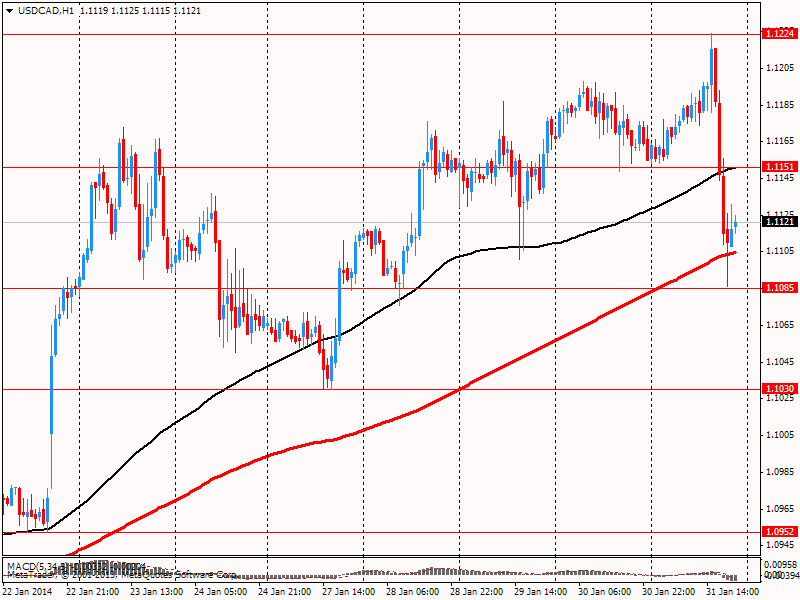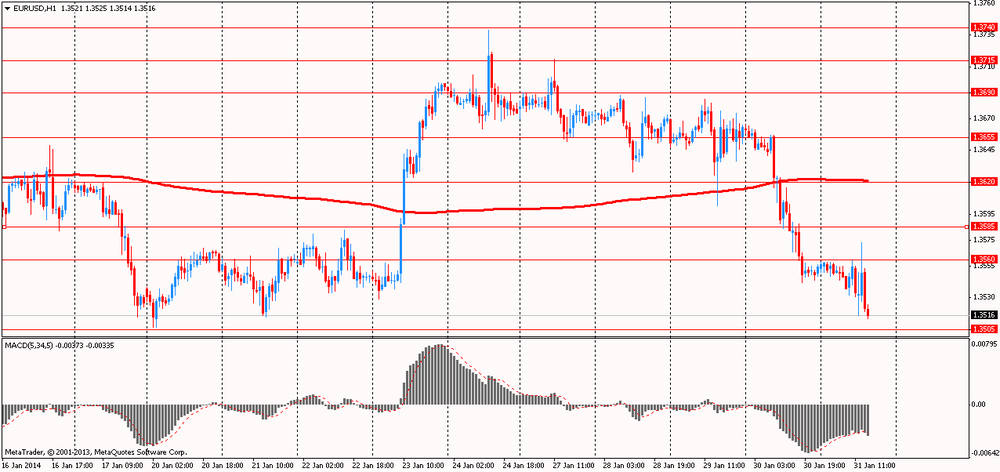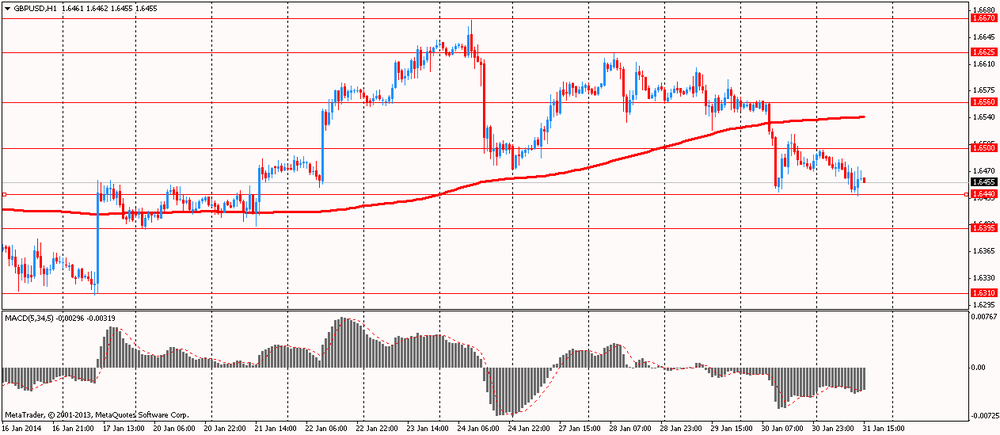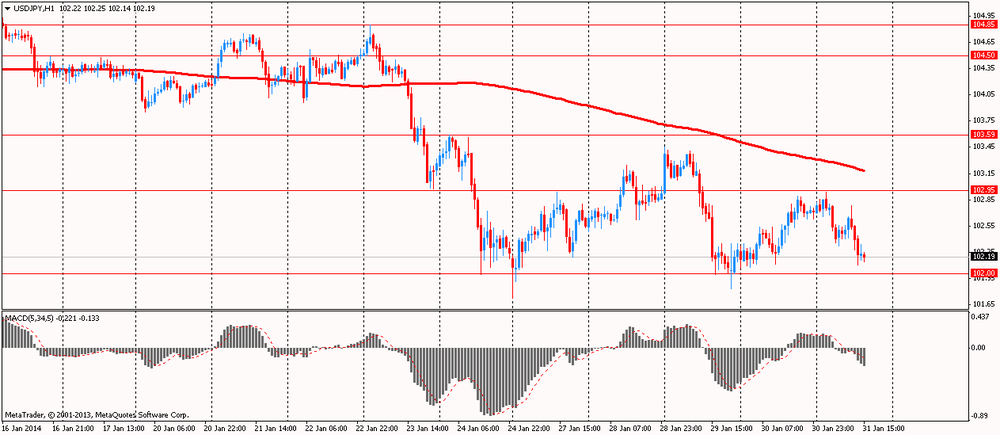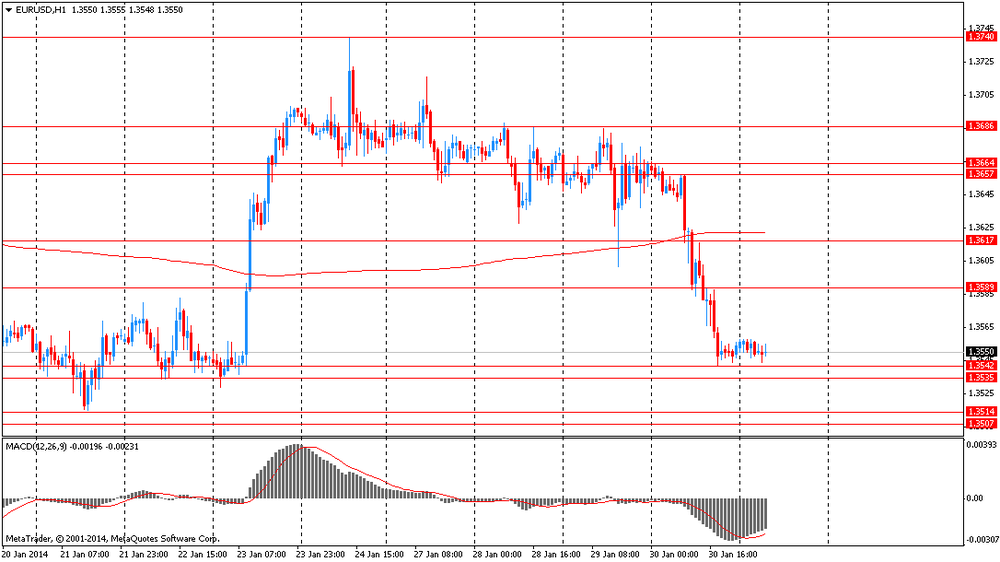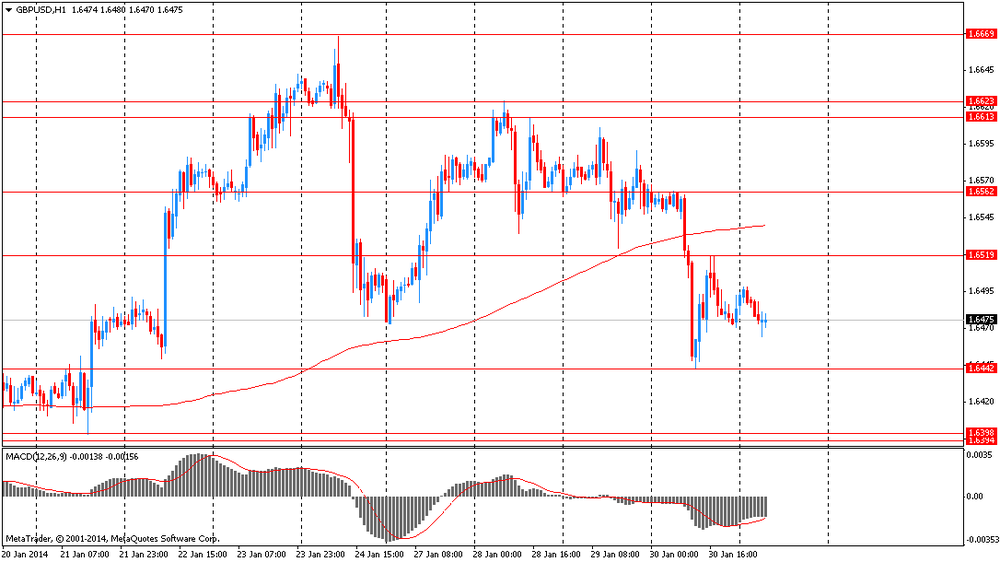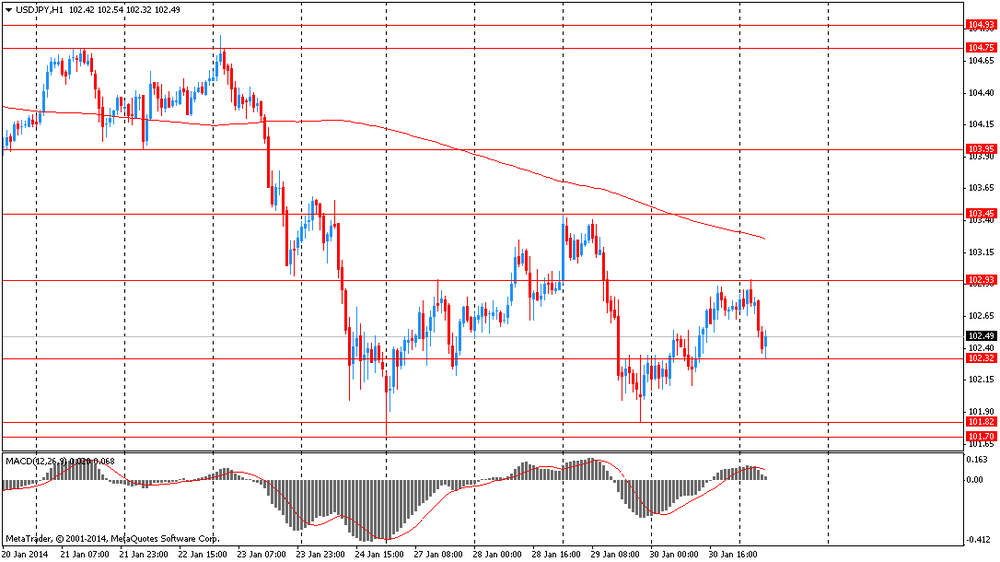Notícias do Mercado
-
20:00
Dow -79.44 15,769.17 -0.50% Nasdaq -5.99 4,117.14 -0.15% S&P -3.9 1,790.29 -0.22%
-
19:21
American focus : the euro fell sharply against the U.S. dollar
The dollar against the euro has grown significantly on the news about the intention of the Bundesbank complete sterilization of bond purchases the ECB to cash injections into the economy , similar to the Fed and QE. Besides support for the U.S. currency had submitted reports .
Ministry of Commerce said that personal spending in December rose to a seasonally adjusted 0.4 % compared with the previous month. Economists had forecast an increase of 0.2%. Spending growth in November was revised up to 0.6%. These gains were the strongest consecutive monthly increase since 2012 . Personal income remained virtually unchanged in December, weaker than the 0.2% growth that economists expected. When accounting for taxes and inflation annual growth was only 0.7 %.
Meanwhile , another report showed that PMI Managers Association in Chicago with correction for January rose to 59.6 from 59.1 in December. It is worth noting that, according to the average forecast of experts for this indicator was down to the level of 59.0 . Recall that the value above 50 is an indicator of accelerated growth in the economy. All components in January remained on the territory of expansion , except the Employment Cost Index . The growth compared with the previous month showed the index of purchase prices and new orders . Declines were observed in the indices of employment and deliveries.
Surprised with the final results of studies that were presented to Thomson-Reuters and the Michigan Institute . They showed that in January, American consumers feel less optimistic about the economy than was recorded in the last month. According to reports, in January the final index of consumer sentiment fell to 81.2 compared with the final reading for December at 82.5 , and the initial estimate for January at around 80.4 . It is worth noting that according to the average estimates of experts , the index was down compared with the December value to the level of 81.0 .
The British pound fell against the U.S. dollar amid risk aversion and the end of the month . In anticipation of the Bank of England next week, experts note that MPC, most likely will not approve further appreciation of the currency. It is also expected that the Bank of England will repeat his dovish tone by changing the statement of intent , as well as hints on future challenges that the economy still faced in the process of recovery.
Pressure on the pound also provided data for the U.S. , which showed that personal spending rose by 0.4 % vs. 0.2 %. Chicago PMI was 59.6 vs. 59.0 , and Michigan's consumer sentiment index was at the level of 81.2 against expectations of 81.0 .
The Canadian dollar rose sharply against the U.S. dollar , thus offsetting any previously lost ground. Improved sentiment against the U.S. dollar on the economic outlook , together with pigeon rhetoric Bank of Canada led the rally. The dynamics also influenced Canadian GDP data , which showed that the economy grew by a fifth consecutive month in November, against the backdrop of growth in the energy and mining, while the demands on electricity and natural gas caused the greatest increase in production in the communal areas since February 2007. Retail trade has also grown . But overall growth was restrained production, which declined for the first time in three months , as well as construction and wholesale trade. Gross domestic product , the total amount of goods and services produced in the country increased by 0.2 %, slightly slower than the 0.3% growth in each of the previous two months , Statistics Canada reported . In annualized growth slowed to 2.6% from 2.7%. The figures coincided with the consensus forecast of economists and Royal Bank of Canada . The pace of expansion put the economy on a path to an annual growth rate of about 2.5% in the fourth quarter , which would be in accordance with the new forecasts from the Bank of Canada, which he presented in its quarterly report on monetary policy last week.
-
18:21
European stock close
European stocks fell, posting their worst start to the year since 2010, as companies from Electrolux AB to Vedanta Resources Plc dropped after reporting results.
The Stoxx Europe 600 Index slipped 0.3 percent to 322.43 at 4:30 p.m. in London, paring earlier losses of as much as 1.7 percent. The equities measure declined 1.8 percent this month as emerging-market currencies tumbled, a Chinese manufacturing gauge contracted and the Federal Reserve slowed its pace of bond buying. The index fell 0.7 percent this week. A gauge of 20 emerging-market currencies, including Brazil’s real, Russia’s ruble and Turkey’s lira, fell 0.3 percent, its 14th drop in 15 days.
Euro-area unemployment held at 12 percent in December, a Eurostat data showed. November’s level was revised to 12 percent, down from a record 12.1 percent in September.
National benchmark indexes retreated in 14 of the 18 western European markets.
FTSE 100 6,510.44 -28.01 -0.43% CAC 40 4,165.72 -14.30 -0.34% DAX 9,306.48 -67.00 -0.71%
Electrolux dropped 9 percent to 138.90 kronor. The world’s second-biggest maker of home appliances said fourth-quarter earnings before interest and taxes fell 23 percent to 1.22 billion kronor ($187 million), missing the average analyst estimate for 1.38 billion kronor.
Diageo Plc (DGE), which yesterday said a slowdown in emerging markets weighed on first-half sales, fell 1.9 percent to 1,786 pence. Goldman Sachs Group Inc. downgraded the world’s biggest distiller to neutral from buy, citing continued challenges to growth in emerging markets.
Deutsche Bank AG slipped 2.8 percent to 35.89 euros. Barclays Plc lowered its rating on Germany’s largest lender to equal weight from overweight, saying it is struggling more than its competitors with deleveraging.
LVMH jumped 7.7 percent to 131.90 euros. The world’s largest luxury-goods maker said sales at its fashion and leather-goods unit, which includes Louis Vuitton and Kenzo, rose 7 percent in the final three months of 2013, from 4 percent in the first nine months of the year.
BT Group Plc (BT/A) advanced 3.3 percent to 383 pence. The biggest U.K. phone company reported third-quarter adjusted earnings before interest, taxes, depreciation and amortization of 1.54 billion pounds ($2.54 billion). The average prediction of analysts was for 1.5 billion pounds. BT also forecast full-year Ebitda may reach the upper limit of its previous prediction of 6 billion pounds to 6.1 billion pounds.
-
17:00
European stock close: FTSE 100 6,510.44 -28.01 -0.43% CAC 40 4,165.72 -14.30 -0.34% DAX 9,306.48 -67.00 -0.71%
-
16:40
Oil: an overview of the market situation
The price of oil fell today , closer to $ 107 per barrel (Brent) and $ 96 per barrel (WTI), which was due to concerns about the emerging economies and the planned reduction of monetary stimulus by the U.S. Federal Reserve. Add that oil prices are on the way to its first monthly drop since September.
Brent crude fell by 3.3 percent in January amidst the challenges in emerging markets , as well as the data presented, which showed that the fuel consumption from China grew at the slowest pace in more than 20 years in 2013. As for oil brand WTI, is due to severe weather conditions in the U.S. and improve the economy , prices are almost unchanged over the month .
I also add that trading volume today was less than usual , as some Asian markets closed due to the Lunar New Year holiday .
One report he presented today showed that OPEC oil production rose in January from December's 2.5 year low , due to the partial recovery in demand in Libya and increased supply from Iraq and Iran. Mining the average was at 29.940 million barrels a day , compared with the revised figure for December - 29.63 million per day.
Meanwhile, we note that the rise of the dollar also helps reduce oil prices. The dollar rose partly because of the U.S. GDP , which grew at an annualized rate of 3.2 percent in the final three months of last year. While the pace of growth slowed in the third quarter , the last increase was much larger than expected at the beginning of the quarter.
It is worth mentioning that the price difference between Brent crude and WTI fell below $ 10 a barrel on the basis of the closing price, which is fixed for the first time since early November 2013.
March futures price for U.S. light crude oil WTI (Light Sweet Crude Oil) fell to $ 97.83 a barrel on the New York Mercantile Exchange (NYMEX).
March futures price for North Sea Brent crude oil mixture fell by 80 cents to $ 106.90 a barrel on the London exchange ICE Futures Europe.
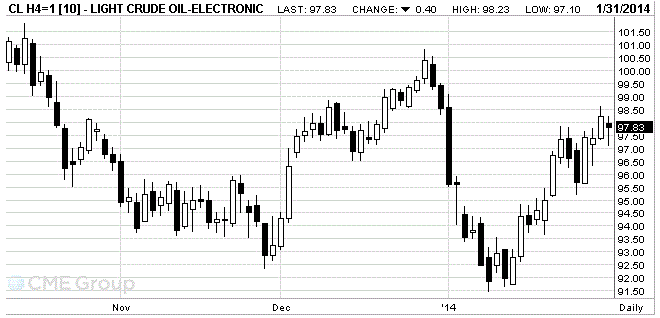
-
16:20
Gold: an overview of the market situation
Gold prices fell sharply , losing the all previously earned a position that has been associated with strong economic growth in the U.S., concerns about the completion of the Federal Reserve's monetary stimulus and lower demand from China. However, adding that by the end of the month gold could still show growth . Since the end of December the precious metal rose by 3.8 percent.
We add that the report presented today by the U.S. showed that Americans have purchased goods and services in December consistently high pace , which was the latest evidence that consumer spending to support the economy . While Christmas sales season ended , personal expenses in December rose to a seasonally adjusted 0.4 % compared with a month earlier , said the Ministry of Commerce on Friday . Economists had forecast an increase of 0.2%. Spending growth in November was revised up to 0.6%. These gains were the strongest consecutive monthly increase since 2012 . For the entire 2013 broadest measure spending on everything from haircuts to refrigerators, rose by 3.1% compared with the previous year . It was the weakest annual growth since 2009 and lower than the growth of 4.1 % over 2012 . But the pace of spending rebounded strongly in the last six months of last year . However , the report pointed to the risks to consumers' ability to promote economic recovery this year.
" There is a serious cash flow from the stock market to gold , and we think that it may continue for the next few weeks ," said Naeem Aslam , chief market analyst AvaTrade.
In addition, experts say that in the near future the market situation is not favorable for gold due to lack of demand in China in the coming weeks during the Christmas holidays . In the absence of new concerns for emerging markets prices can return to recent lows and may fall below $ 1,230 an ounce.
I also add that while China celebrates the New Year by the lunar calendar , gold prices could approach $ 1,200. Margins in China on the eve of holidays fell to $ 4 per ounce to the spot price in London with more than $ 20 in early January. Analysts do not expect this year the same high demand for gold in China , as last year , when the country imported a record 1,158 tons.
March futures price for gold on COMEX today dropped to $ 1241.90 per ounce.
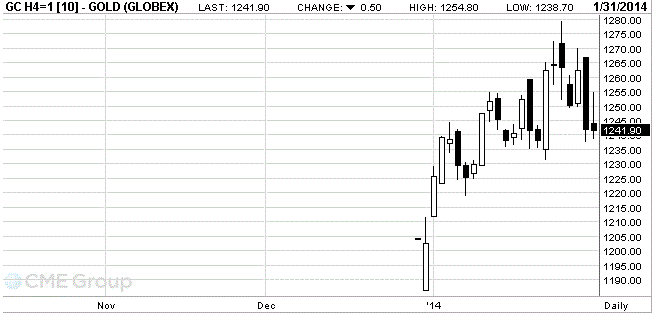
-
14:55
U.S.: Reuters/Michigan Consumer Sentiment Index, January 81.2 (forecast 81.0)
-
14:45
U.S.: Chicago Purchasing Managers' Index , January 59.6 (forecast 59.0)
-
14:34
U.S. Stocks open: Dow 15,690.57 -158.04 -1.00%, Nasdaq 4,067.83 -55.30 -1.34%, S&P 1,778.87 -15.32 -0.85%
-
14:26
Before the bell: S&P futures -0.95%, Nasdaq futures -0.64%
U.S. stock-index futures sank, as earnings reports at companies from Amazon (AMZN).com Inc. to Wal-Mart Stores Inc. disappointed investors.
Global markets:
Nikkei 14,914.53 -92.53 -0.62%
FTSE 6,440.4 -98.05 -1.50%
CAC 4,114.53 -65.49 -1.57%
DAX 9,198.49 -174.99 -1.87%
Crude oil $97.47 (-0.77%)
Gold $1252.70 (-0.82%).
-
13:48
Option expiries for today's 1400GMT cut
USD/JPY Y101.50, Y101.60, Y102.00/25(VL), Y102.90, Y103.00(VL), Y103.40
EUR/USD $1.3475-85, $1.3530, $1.3550, $1.3570, $1.3575, $1.3650
GBP/USD $1.6500, $1.6600
EUR/GBP stg0.8280
EUR/CHF Chf1.2200, Chf1.2250
EUR/NOK Nok8.5000
AUD/USD $0.8650, $0.8800
AUD/JPY Y90.70, Y91.10
AUD/NZD NZ$1.0550
USD/CAD C$1.1000, C$1.1100, C$1.1175, C$1.1200
-
13:32
U.S.: Personal spending , December +0.4% (forecast +0.2%)
-
13:31
U.S.: Employment Cost Index, Quarter IV +0.5% (forecast +0.4%)
-
13:30
Canada: GDP (m/m) , November +0.2% (forecast +0.2%)
-
13:30
U.S.: PCE price index ex food, energy, m/m, December +0.1% (forecast +0.1%)
-
13:30
U.S.: PCE price index ex food, energy, Y/Y, December +1.2% (forecast +1.2%)
-
13:30
U.S.: Personal Income, m/m, December 0.0% (forecast +0.2%)
-
13:16
European session: the euro fell
07:00 Germany Retail sales, real adjusted December +1.5% +0.2% -2.5%
07:00 Germany Retail sales, real unadjusted, y/y December +1.6% +1.9% -2.4%
07:45 France Consumer spending December +1.4% -0.2% -0.1%
07:45 France Consumer spending, y/y December +1.5% -0.8% +0.2%
10:00 Eurozone Harmonized CPI, Y/Y (Preliminary) January +0.8% +0.9% +0.7%
10:00 Eurozone Unemployment Rate December 12.1% 12.1% 12.0%
The euro exchange rate shows mixed against the U.S. dollar with a predominance of negative component . Today we have published data on inflation and unemployment in the eurozone. Eurozone inflation slowed for the second month in a row in January , showed preliminary estimate by Eurostat. Another report showed that the unemployment rate in the currency bloc fell slightly in December.
Inflation unexpectedly fell to 0.7 percent in January from 0.8 percent in December . Economists had forecast that inflation will rise to 0.9 percent. Meanwhile, core inflation, which excludes prices of energy , food, alcohol and tobacco, rose to 0.8 percent from 0.7 percent in December . Result is consistent with economists' expectations . Inflation has remained below the target level of the European Central Bank " below but close to 2 percent," the twelfth consecutive month.
In a separate report , Eurostat said that the unemployment rate fell slightly to 12 percent in December compared with 12.1 percent in November. According to expectations , the unemployment rate was to remain unchanged. The number of unemployed fell by 129,000 from November to 19.01 million . In the 28 countries of the EU unemployment rate was 10.7 percent in December , compared with 10.8 percent in November .
In light of these results , Martin Van Vlient analyst ING, commented: "Given the uncertain recovery and high unemployment rate (12.0 %) , wage and price pressures in the euro area is likely to remain low for a longer time than currently expects the ECB ... However, at the moment, new signs of recovery suggest that during the meeting next week the central bank chooses to " keep their powder dry ."
At the same time , pressure on the single currency was weak retail sales data in Germany. German retail trade turnover decreased unexpectedly during the Christmas season , showed the preliminary results of the Federal Statistical Office .
Retail turnover fell by 2.5 percent in real terms compared with a month ago , offset by growth in November to 0.9 percent. Sales are expected to increase were 0.2 percent . Retail sales , on an annual basis , fell 2.4 percent in December , in contrast to 1.1 percent growth , placed in November and 1.9 percent growth expected by economists. Retail trade turnover during the year 2013 was 0.1 percent more than in the previous year , showing the same pace as in 2012 .
The British pound fell against the U.S. dollar despite the strong consumer confidence . UK consumer optimism in January reached its highest level in more than six years , helped by an improvement in both their personal finances because of the economic situation . This is evidenced by the results of the survey, presented Friday by research company GfK. Monthly consumer confidence index calculated by GfK, in January rose to -7 to -13 in December. This is the highest level since September 2007. The result was better than -10 expected by most economists .
"After three consecutive drops at one point in January, the index showed a dramatic return to the sharp increase , which was observed last summer ," - said Nick Moon , managing director of the Social Science Research in GfK. " All five of the individual elements that make up the index , showed a significant increase in this month ."
EUR / USD: during the European session, the pair rose to $ 1.3573 , and then fell to $ 1.3514
GBP / USD: during the European session, the pair fell to $ 1.6438
USD / JPY: during the European session, the pair fell to Y102.10
At 13:30 GMT , Canada will report on changes in the volume of GDP in November. In the U.S. at 13:30 GMT will main index for personal consumption expenditures , changes in spending, deflator for personal consumption expenditures in December , the index of the cost of labor for the 4th quarter , in 14:45 GMT - Chicago PMI index for January, in 14:55 GMT - an indicator of consumer confidence from the University of Michigan in January
-
11:30
European stocks declined
European stocks declined, with the Stoxx Europe 600 Index heading for the worst start to the year since 2010, as investors awaited reports on euro-area unemployment and U.S. consumer sentiment. Japanese shares fell and U.S. stock-index futures were little changed.
The Stoxx 600 has declined 1.9 percent this month, the biggest January drop since 2010, as the Federal Reserve reduced the pace of its bond buying for the second time in as many months and emerging-market currencies tumbled. The benchmark gauge has fallen 0.9 percent so far this week.
A report at 10 a.m. London time may show euro-area unemployment held at a record 12.1 percent in December, according to economists in a Bloomberg survey. The jobless rate has stayed at that level since April.
In the U.S., data at 9:55 a.m. New York time may show the Thomson Reuters/University of Michigan final index of sentiment was 81 in January, according to economists surveyed by Bloomberg. That compares with a preliminary figure of 80.4 and a December reading of 82.5.
FTSE 100 6,488.64 -49.81 -0.76%
CAC 40 4,142.52 -37.50 -0.90%
DAX 9,249.81 -123.67 -1.32%
-
10:30
Option expiries for today's 1400GMT cut
USD/JPY Y101.50, Y101.60, Y102.00/25(VL), Y102.90, Y103.00(VL), Y103.40
EUR/USD $1.3475-85, $1.3530, $1.3550, $1.3570, $1.3575, $1.3650
GBP/USD $1.6500, $1.6600
EUR/GBP stg0.8280
EUR/CHF Chf1.2200, Chf1.2250
EUR/NOK Nok8.5000
AUD/USD $0.8650, $0.8800
AUD/JPY Y90.70, Y91.10
AUD/NZD NZ$1.0550
USD/CAD C$1.1000, C$1.1100, C$1.1175, C$1.1200
-
10:00
Eurozone: Harmonized CPI, Y/Y, January +0.8% (forecast +0.9%)
-
10:00
Eurozone: Unemployment Rate , December 12.0% (forecast 12.1%)
-
09:20
FTSE 100 6,527.32 -11.13 -0.17%, CAC 40 4,176.26 -3.76 -0.09%, Xetra DAX 9,321.22 -52.26 -0.56%
-
07:45
France: Consumer spending , December -0.1% (forecast -0.2%)
-
07:45
France: Consumer spending, y/y, December +0.2% (forecast -0.8%)
-
07:35
European bourses are initially seen mixed Friday: the FTSE is seen trading 0.2% lower, with the DAX up 0.1% and the CAC up 0.4%.
-
07:28
Asian session: The dollar headed
00:05 United Kingdom Gfk Consumer Confidence January -13 -10 -7
00:30 Australia Producer price index, q / q Quarter IV +1.3% +0.7% +0.2%
00:30 Australia Producer price index, y/y Quarter IV +1.9% +2.7% +1.9%
00:30 Australia Private Sector Credit, m/m December +0.3% +0.4% +0.5%
00:30 Australia Private Sector Credit, y/y December +3.8% +3.9%
The dollar headed for its best January since 2010 versus a basket of its peers ahead of data forecast to show Americans increased spending for an eighth month, adding to evidence the U.S. economy is growing. U.S. consumer spending probably rose 0.2 percent in December, following a 0.5 advance in November that was the biggest in five months, according to the median estimate of economists surveyed by Bloomberg before the Commerce Department report today.
The yen extended monthly gains versus its 16 major peers as equities fell in Japan and data showing accelerating inflation reduced the case for monetary easing. A report today showed Japan’s December core consumer prices rose 1.3 percent from a year earlier, compared with the median estimate for a 1.2 percent gain in a Bloomberg News survey.
The euro was poised for its biggest monthly decline since March and the first loss since August against the greenback before a European Central Bank policy meeting Feb. 6.
The New Zealand dollar extended its worst start to a year since 2010 after Reserve Bank Governor Graeme Wheeler said today the exchange rate has “been stronger and initial indications are that house price inflation may be starting to moderate. The exchange rate remains a considerable headwind for the economy, and the bank does not believe its current level is sustainable in the long run,” he said.
EUR / USD: during the Asian session, the pair traded in the range of $ 1.3545-55
GBP / USD: during the Asian session the pair fell to $ 1.6465
USD / JPY: on Asian session the pair fell to Y102.30
Although the week's main events are behind us, there is still a full calendar ahead Friday. The European calendar gets underway at 0700GMT, with the release of the German December retail sales data. Sales are seen rising 0.2% on month, up 1.9% on year. At the same time, the German Finance Ministry releases its monthly report. French data set for release at 0745GMT includes the December construction spending data and the December PPI numbers. ECB Governing Council members Nowotny, Noyer and Rimsevics are to speak in Budapest, Hungary from 0800GMT. The EMU data set for release at 1000GMT is the December employment data and, perhaps more importantly, the January flash HICP data. HICP is seen by analysts at +0.9% on year, although there is a risk of a downside surprise. -
07:00
Germany: Retail sales, real unadjusted, y/y, December -2.4% (forecast +1.9%)
-
07:00
Germany: Retail sales, real adjusted , December -2.5% (forecast +0.2%)
-
06:28
Commodities. Daily history for Jan 30’2014:
Gold $1,243.98 -23.36 -1.84%
Oil $97.98 +0.62 +0.64%
-
06:27
Stocks. Daily history for Jan 30’2014:
Nikkei 225 15,007.06 -376.85 -2.45%
Hang Seng 22,035.42 -106.19 -0.48%
S&P/ASX 200 5,188.06 -40.95 -0.78%
Shanghai Composite 2,033.08 -16.83 -0.82%
FTSE 100 6,538.45 -5.83 -0.09%
CAC 40 4,180.02 +23.04 +0.55%
DAX 9,373.48 +36.75 +0.39%
Dow +109.94 15,848.73 +0.70%
Nasdaq +71.7 4,123.13 +1.77%
S&P +19.99 1,794.19 +1.13%
-
06:25
Currencies. Daily history for Jan 30'2014:
(pare/closed(00:00 GMT +02:00)/change, %)
EUR/USD $1,3554 -0,80%
GBP/USD $1,6483 -0,49%
USD/CHF Chf0,9026 +0,90%
USD/JPY Y102,71 +0,42%
EUR/JPY Y139,22 -0,35%
GBP/JPY Y169,31 -0,06%
AUD/USD $0,8792 +0,63%
NZD/USD $0,8164 -0,59%
USD/CAD C$1,1155 -0,13%
-
06:07
Schedule for today, Friday, Jan 31’2014:
00:05 United Kingdom Gfk Consumer Confidence January -13 -10 -7
00:30 Australia Producer price index, q / q Quarter IV +1.3% +0.7% +0.2%
00:30 Australia Producer price index, y/y Quarter IV +1.9% +2.7% +1.9%
00:30 Australia Private Sector Credit, m/m December +0.3% +0.4% +0.5%
00:30 Australia Private Sector Credit, y/y December +3.8% +3.9%
05:00 Japan Housing Starts, y/y December +14.1% +13.9%
07:00 Germany Retail sales, real adjusted December +1.5% +0.2%
07:00 Germany Retail sales, real unadjusted, y/y December +1.6% +1.9%
07:45 France Consumer spending December +1.4% -0.2%
07:45 France Consumer spending, y/y December +1.5% -0.8%
10:00 Eurozone Harmonized CPI, Y/Y (Preliminary) January +0.8% +0.9%
10:00 Eurozone Unemployment Rate December 12.1% 12.1%
13:30 Canada GDP (m/m) November +0.3% +0.2%
13:30 U.S. Personal Income, m/m December +0.2% +0.2%
13:30 U.S. Personal spending December +0.5% +0.2%
13:30 U.S. PCE price index ex food, energy, m/m December +0.1% +0.1%
13:30 U.S. PCE price index ex food, energy, Y/Y December +1.1% +1.2%
13:30 U.S. Employment Cost Index Quarter IV +0.4% +0.4%
14:45 U.S. Chicago Purchasing Managers' Index January 59.1 59.0
14:55 U.S. Reuters/Michigan Consumer Sentiment Index (Finally) January 80.4 81.0
-
